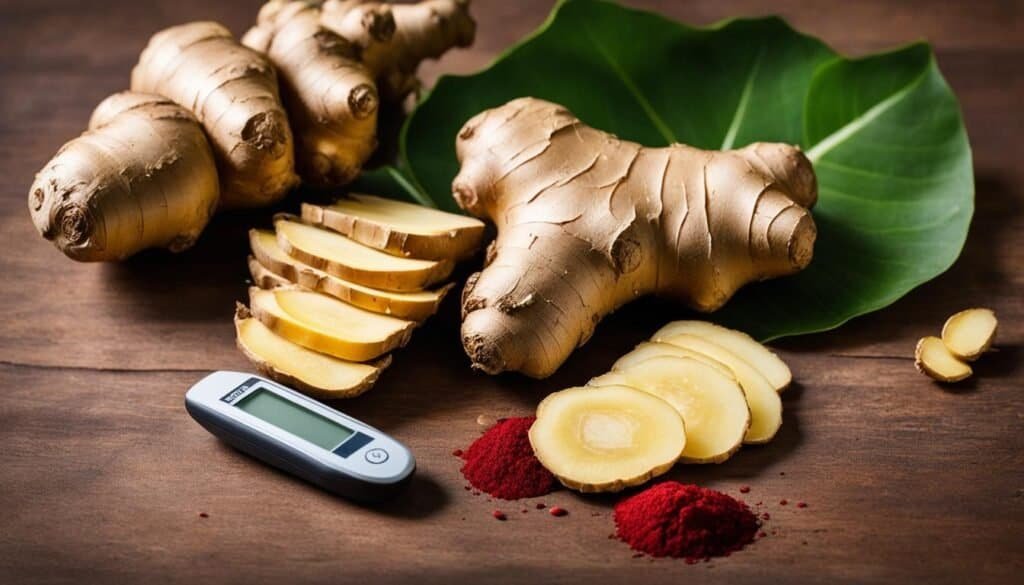Ginger is a versatile root that offers numerous surprising benefits for overall health and wellness. From its rich history in traditional medicine to its culinary uses, ginger has managed to establish itself as a powerful natural remedy. Its digestive power, immune system support, anti-inflammatory effects, antioxidant properties, analgesic function, cardiovascular health benefits, and potential anti-diabetic and weight management properties make ginger a popular choice among health enthusiasts. Additionally, ginger has shown promising effects on menstrual pain relief, skin health, and acne treatment. By integrating ginger into your lifestyle, you can enhance your well-being holistically.
Key Takeaways:
- Ginger offers a wide range of surprising benefits for overall health and wellness.
- It promotes digestive health, supports the immune system, and has anti-inflammatory and antioxidant properties.
- Ginger can provide natural pain relief, improve cardiovascular health, and potentially aid in managing diabetes and weight.
- It may also help alleviate menstrual pain and promote skin health and acne treatment.
- By incorporating ginger into your daily routine, you can experience its holistic impact on health maintenance.
Exploring the Origin and Uses of Ginger
Ginger has a rich history in traditional medicine, where it has been used for centuries to treat various ailments. This versatile root originated in Southeast Asia and has since spread to other parts of the world, becoming a staple in many cultures and cuisines.
Historical Use of Ginger in Traditional Medicine
In traditional medicine practices, ginger has been highly regarded for its healing properties. It has been used to relieve digestive discomfort, alleviate nausea, reduce inflammation, improve circulation, and even aid in respiratory conditions. The therapeutic benefits of ginger have been passed down through generations, highlighting its effectiveness and enduring popularity.
Ginger in Modern Culinary Practices
Beyond its medicinal uses, ginger has also become a beloved ingredient in modern culinary practices. Its unique flavor and aroma lend themselves well to a wide range of dishes. Ginger can add a zesty and refreshing kick to stir-fries, soups, marinades, sauces, and even desserts. From sweet to savory, ginger adds a delightful dimension to the flavor profile of various cuisines around the world.
The Diverse Forms of Ginger
Ginger is available in different forms to cater to various needs and preferences. Fresh ginger root, with its pungent and zingy flavor, is commonly used in cooking and juicing. Ground ginger powder offers convenience and can be effortlessly incorporated into recipes. Ginger oil, derived from the root, is often used in aromatherapy and topical applications. Additionally, ginger supplements, including capsules and extracts, offer a concentrated dose of the root’s beneficial compounds for those seeking targeted health support.
With its rich history, versatile uses, and diverse forms, ginger continues to captivate both traditional medicine enthusiasts and culinary adventurers alike.
The Digestive Power of Ginger
Ginger has been known for its digestive benefits for centuries. It can help alleviate common digestive issues such as indigestion, bloating, and flatulence. The active compounds in ginger aid in digestion by stimulating the production of digestive enzymes and improving gut motility. Ginger is also a popular natural remedy for nausea, including morning sickness during pregnancy and chemotherapy-induced nausea. Its anti-inflammatory properties and ability to reduce gastric irritation contribute to its effectiveness in calming the digestive system.
Ginger’s Role in Immune System Support
Ginger is known for its immune system support due to its antioxidant and anti-inflammatory properties. These properties help to strengthen the immune system and protect the body against infections and diseases. Ginger also contains compounds that exhibit antimicrobial activity, further supporting immune health. By incorporating ginger into your diet, you can give your immune system an extra boost.
To understand how ginger impacts the immune system, it’s important to look at its key components. Ginger contains a variety of bioactive compounds, including gingerol, which has been shown to possess strong antioxidant and anti-inflammatory effects. Antioxidants play a crucial role in defending the body against harmful free radicals that can damage cells and weaken the immune system. By neutralizing these free radicals, ginger’s antioxidants help fortify the immune system and enhance its ability to fight off infections and diseases.
Ginger’s anti-inflammatory properties also contribute to its immune-boosting effects. Chronic inflammation can suppress the immune response and make the body more susceptible to illnesses. However, the anti-inflammatory compounds in ginger can help reduce inflammation and promote a healthier immune system. By minimizing inflammation, ginger supports optimal immune function and allows the body to better defend itself against pathogens.
In addition to its antioxidant and anti-inflammatory properties, ginger has been found to exhibit antimicrobial activity. Certain compounds in ginger, such as gingerol and zingerone, have been shown to possess antibacterial, antiviral, and antifungal properties. These properties help to inhibit the growth of harmful microorganisms and support a strong immune system defense.
To enjoy the immune-boosting benefits of ginger, there are various ways you can incorporate it into your diet. Adding fresh ginger root to your recipes, drinking ginger tea, or consuming ginger supplements are all effective methods. Additionally, try incorporating ginger into dishes such as soups, stir-fries, or smoothies for a flavorful and immune-enhancing twist.
With its antioxidant, anti-inflammatory, and antimicrobial properties, ginger plays a valuable role in supporting and strengthening the immune system. By incorporating ginger into your lifestyle, you can give your body the extra support it needs to maintain optimal immune health.
Anti-Inflammatory Effects of Ginger
Ginger has been found to possess powerful anti-inflammatory properties, making it a valuable natural remedy for reducing inflammation in the body. Inflammation is a normal response of the body to injury or infection. However, chronic inflammation can contribute to various health issues, including cardiovascular disease, arthritis, and even cancer.
One of the key bioactive compounds in ginger responsible for its anti-inflammatory effects is gingerol. Gingerol is known for its antioxidant and anti-inflammatory properties, which help combat oxidative stress and reduce inflammation in the body.
Understanding Inflammation and its Effects on Health
Inflammation is the body’s defense mechanism against harmful stimuli, including pathogens, damaged cells, or irritants. When the body detects an injury or infection, it triggers a complex inflammatory response to eliminate the threat and initiate the healing process. Acute inflammation is a necessary and beneficial response that helps protect the body and promote tissue repair.
However, when inflammation becomes chronic, it can have detrimental effects on health. Chronic inflammation is characterized by persistent activation of the immune system, leading to ongoing tissue damage and disruption of normal physiological processes. It is a major contributing factor to the development of various chronic diseases, including cardiovascular disease, diabetes, obesity, and neurodegenerative disorders.
Studies Supporting Ginger’s Anti-Inflammatory Properties
“Scientific studies have provided strong evidence supporting the anti-inflammatory effects of ginger. Research has shown that ginger can inhibit several pathways involved in inflammation, including the production of pro-inflammatory molecules like cytokines and chemokines.”
A study published in the Journal of Medicinal Food found that daily consumption of ginger significantly reduced markers of inflammation in individuals with type 2 diabetes. The study concluded that ginger could be a potential therapeutic agent for managing inflammation in diabetic patients.
In another study published in the Journal of Ethnopharmacology, researchers investigated the anti-inflammatory properties of ginger extract in human cells. The study demonstrated that ginger extract inhibited the production of pro-inflammatory molecules, effectively reducing inflammation and protecting against inflammatory diseases.
These studies, along with many others, provide scientific evidence supporting ginger’s role in reducing inflammation and its potential benefits for overall health and well-being.
To experience the anti-inflammatory effects of ginger, consider incorporating it into your diet by adding fresh ginger to your meals, drinking ginger tea, or taking ginger supplements. Additionally, topical applications of ginger-infused products can provide localized relief from inflammation-related conditions such as joint pain and muscle soreness.
| Studies on Ginger and Inflammation | Findings |
|---|---|
| Study 1 | Ginger consumption reduced markers of inflammation in individuals with type 2 diabetes. |
| Study 2 | Ginger extract inhibited the production of pro-inflammatory molecules in human cells. |
| Study 3 | Ginger supplementation reduced inflammation in patients with arthritis. |
Ginger’s Antioxidant Properties and Your Health
Ginger is not only known for its unique flavor and versatility in culinary creations, but it also boasts impressive health benefits, particularly through its antioxidant properties. These antioxidants, including the compound gingerol, play a crucial role in protecting the body against free radicals and oxidative stress.
Fighting Free Radicals with Ginger
Free radicals are unstable molecules that are formed during normal body processes, as well as through exposure to environmental factors such as pollution and UV radiation. These molecules can cause damage to cells, DNA, and proteins, leading to various health issues.
Fortunately, ginger contains a range of antioxidants that can help neutralize these free radicals and prevent cellular damage. Antioxidants work by donating electrons to stabilize free radicals, reducing their harmful effects on the body.
The Impact of Antioxidants on Longevity
Antioxidants, such as those found in ginger, play a crucial role in promoting longevity and overall well-being. By protecting cells from free radical damage, antioxidants help maintain cellular health and integrity, preventing premature aging and reducing the risk of chronic diseases.
Scientific studies have shown that diets rich in antioxidants are associated with a lower risk of conditions such as heart disease, cancer, and neurodegenerative disorders. By incorporating ginger into your diet, you can harness the power of these antioxidants and potentially enhance your longevity.
Antioxidant Content in Different Forms of Ginger
| Ginger Form | Total Antioxidant Capacity (per 100g) |
|---|---|
| Fresh Ginger | 28,811 µmol TE |
| Ginger Powder | 11,601 µmol TE |
| Ginger Extract | 8,320 µmol TE |
Source: Journal of Agricultural and Food Chemistry
Note: The total antioxidant capacity is measured in micromoles of Trolox equivalents (µmol TE), a common unit used to quantify antioxidants.
This table demonstrates the varying levels of antioxidants in different forms of ginger. Fresh ginger, in its raw form, contains the highest amount of antioxidants, followed by ginger powder and ginger extract.
Incorporating ginger into your daily routine, whether through fresh ginger in cooking or ginger supplements, can help harness these antioxidants and reap the health benefits they offer.
The Analgesic Function of Ginger
Ginger possesses analgesic properties that make it a natural pain reliever. It has shown effectiveness in alleviating various types of pain, including muscle soreness, menstrual cramps, and arthritis pain. The key compounds found in ginger, such as gingerol and zingiberene, have demonstrated both anti-inflammatory and analgesic effects.
By reducing inflammation and blocking pain signals, ginger provides relief from discomfort without the need for synthetic painkillers. This makes ginger a potential alternative for those who prefer natural pain relief methods and want to avoid the potential side effects associated with long-term use of synthetic pain medications.
To fully benefit from ginger’s analgesic properties, it can be consumed in different forms, including fresh ginger root, ginger tea, or ginger supplements. Additionally, incorporating ginger into your cooking can add a delicious flavor and provide potential pain-relieving effects.
Ginger’s natural pain-relieving qualities and its potential as an alternative to synthetic painkillers make it an attractive option for individuals seeking a holistic approach to managing pain and discomfort.
Surprising Benefits of Ginger for Cardiovascular Health
Ginger, known for its versatility and numerous health benefits, offers surprising advantages for cardiovascular health. Its impact on blood circulation and cholesterol reduction makes ginger a valuable addition to a heart-healthy lifestyle.
Ginger’s Influence on Blood Circulation
Ginger aids in improving blood circulation by reducing the formation of blood clots and promoting vasodilation. The active compounds in ginger help relax blood vessels, allowing for smoother blood flow throughout the body. By enhancing blood circulation, ginger supports the optimal functioning of the cardiovascular system.
How Ginger Can Lower Cholesterol Levels
Studies have shown that ginger has cholesterol-lowering effects, particularly in reducing LDL (low-density lipoprotein) cholesterol levels. Consuming ginger regularly can help maintain healthy cholesterol levels in the body. By supporting cholesterol reduction, ginger contributes to overall heart health and reduces the risk of cardiovascular diseases.
Incorporating ginger into your diet or consuming ginger supplements can have a positive impact on your cardiovascular health. However, it’s crucial to consult with a healthcare professional before making any significant dietary changes or starting new supplements.
By harnessing the benefits of ginger for cardiovascular health, individuals can take proactive steps towards maintaining a healthy heart and overall well-being.
Ginger and Its Anti-Diabetic Potential

Ginger has demonstrated potential in the management of diabetes. It can help regulate blood sugar levels by increasing insulin sensitivity, enhancing glucose uptake, and reducing complications associated with diabetes. Preliminary studies suggest that ginger’s anti-diabetic effects can be attributed to its bioactive compounds, particularly gingerol. Incorporating ginger into a balanced diet may provide additional support for individuals with diabetes.
Diabetes is a chronic condition characterized by high blood sugar levels. It affects millions of people worldwide and can lead to various health complications if not properly managed. By incorporating ginger into their daily diet, individuals with diabetes can potentially benefit from its anti-diabetic properties.
Ginger’s impact on blood sugar regulation is mainly attributed to its ability to increase insulin sensitivity, which allows the body to use insulin more effectively. Insulin is a hormone that plays a crucial role in regulating blood sugar levels. When cells become resistant to insulin or the body doesn’t produce enough insulin, blood sugar levels can rise, leading to diabetes.
Studies have shown that ginger can enhance glucose uptake by muscle cells, helping to lower blood sugar levels. Gingerol, one of the main bioactive compounds in ginger, has been found to stimulate glucose absorption in skeletal muscle cells.
Furthermore, ginger has been shown to reduce complications associated with diabetes, such as oxidative stress, inflammation, and diabetic nephropathy. Oxidative stress occurs when there is an imbalance between free radicals and antioxidants in the body, leading to cellular damage. Ginger’s antioxidant properties can help protect against oxidative stress and reduce inflammation, which is often elevated in individuals with diabetes.
Incorporating ginger into a balanced diet can be as simple as adding fresh ginger to meals, consuming ginger tea, or using ginger as a spice in cooking. However, it is essential to consult with a healthcare professional or a registered dietitian before making any significant dietary changes, especially for individuals with existing medical conditions like diabetes.
Weight Management: Can Ginger Help?
Ginger has been the subject of numerous studies examining its potential role in weight management. While it’s important to note that ginger alone cannot guarantee weight loss, it may offer some benefits when incorporated into a well-balanced diet and active lifestyle.
Thermogenic Properties of Ginger and Weight Loss
Ginger possesses thermogenic properties, meaning it can increase metabolism and promote fat burning. This is attributed to the compounds found in ginger, such as gingerol. By increasing metabolism, ginger may help the body burn calories more efficiently, potentially contributing to weight loss goals.
Appetite Suppression and Ginger
Another potential benefit of ginger for weight management is its ability to suppress appetite and reduce food cravings. This can be particularly helpful when trying to create a calorie deficit for weight loss. By incorporating ginger into your diet, you may experience a reduced desire to snack or overeat, which can support your weight management efforts.
It’s important to note that while ginger may offer these potential benefits, it should not be relied upon as the sole method of weight loss. It is best to combine ginger with a well-balanced diet that includes whole foods, plenty of fruits and vegetables, lean proteins, and healthy fats. Additionally, regular physical activity is crucial for overall health and weight management.
The Impact of Ginger on Menstrual Pain and Women’s Health
Ginger has shown promise in relieving menstrual pain, a common issue faced by many women. Its anti-inflammatory properties can help reduce prostaglandin levels, which are responsible for menstrual cramps. Ginger’s ability to alleviate menstrual pain makes it a natural alternative to painkillers and may improve overall women’s health during the menstrual cycle.
The Role of Ginger in Skin Health and Acne Treatment
Ginger offers a range of benefits for maintaining healthy skin and treating acne. Its antimicrobial properties make it a potential natural remedy for acne by fighting against bacteria and fungi that contribute to breakouts. Additionally, ginger’s antioxidants play a crucial role in anti-aging skincare, protecting skin cells from damage caused by free radicals, which can lead to premature aging.
Incorporating ginger into your skincare routine can help enhance skin health and reduce acne-related concerns. You can use ginger-infused topical products or create your own DIY ginger masks or treatments. The benefits of ginger for skin health and acne treatment make it a valuable ingredient to consider in your daily skincare regimen.
Anti-microbial Benefits of Ginger for Skin
Ginger possesses antimicrobial effects that can aid in the treatment of acne and other skin infections. The active compounds in ginger help combat the growth of bacteria and fungi that contribute to skin issues. By incorporating ginger into your skincare routine, you can harness its natural antimicrobial properties to maintain healthy and clear skin.
Ginger and Its Anti-aging Skin Benefits
Ginger’s antioxidants play a significant role in anti-aging skincare. Free radicals, which are unstable molecules that can cause damage to skin cells, contribute to premature aging. The antioxidants in ginger neutralize these free radicals, protecting skin cells and promoting a more youthful appearance. By incorporating ginger into your skincare routine, you can benefit from its anti-aging effects and maintain healthier, more youthful-looking skin.
Conclusion
Integrating ginger into your lifestyle can have a profound impact on your overall well-being. Whether you choose to incorporate it into your cooking, take it as a supplement, or use ginger-infused products, the numerous health benefits of ginger are undeniable.
Ginger offers a holistic approach to health maintenance, providing a wide range of advantages for various aspects of your well-being. From improving digestion and supporting the immune system to reducing inflammation and aiding in weight management, ginger’s versatility makes it a valuable addition to any wellness routine.
By embracing the power of ginger, you can experience enhanced vitality and a healthier lifestyle. So, why not start exploring the many ways you can incorporate ginger into your daily life? Whether it’s adding a splash of ginger to your favorite recipes, sipping on ginger tea, or using ginger-infused skincare products, you’ll be reaping the holistic benefits of this remarkable root.
FAQ
What are the benefits of ginger for health and wellness?
Ginger offers numerous surprising benefits for overall health and wellness. Its digestive power, immune system support, anti-inflammatory effects, antioxidant properties, analgesic function, cardiovascular health benefits, and potential anti-diabetic and weight management properties make ginger a popular choice among health enthusiasts. Additionally, ginger has shown promising effects on menstrual pain relief, skin health, and acne treatment.
Where did ginger originate and how is it used?
Ginger originated in Southeast Asia and has since spread to other parts of the world. It has a rich history in traditional medicine and is widely used in modern culinary practices, known for its unique flavor and aroma. Ginger comes in different forms, such as fresh ginger root, ground ginger, ginger oil, and ginger supplements, making it convenient for various uses in cooking and natural remedies.
How does ginger support digestive health?
Ginger has been known for its digestive benefits for centuries. It can help alleviate common digestive issues such as indigestion, bloating, and flatulence. The active compounds in ginger aid in digestion by stimulating the production of digestive enzymes and improving gut motility. Ginger is also a popular natural remedy for nausea, including morning sickness during pregnancy and chemotherapy-induced nausea.
What role does ginger play in supporting the immune system?
Ginger is known for its immune system support due to its antioxidant and anti-inflammatory properties. These properties help strengthen the immune system and protect the body against infections and diseases. Ginger also contains compounds that exhibit antimicrobial activity, further supporting immune health.
How does ginger reduce inflammation?
Ginger has powerful anti-inflammatory properties, attributed to the presence of gingerol, its main bioactive compound. It can help reduce inflammation in the body, which is associated with various health issues. Scientific studies have supported ginger’s ability to inhibit inflammatory pathways and alleviate symptoms associated with chronic inflammation.
How does ginger act as an antioxidant?
Ginger contains a range of antioxidants, including gingerol, that help fight free radicals and oxidative stress in the body. By neutralizing free radicals, ginger’s antioxidants can protect cells from damage and potentially slow down the aging process.
Can ginger provide natural pain relief?
Yes, ginger has analgesic properties that provide natural pain relief. It can help alleviate various types of pain, including muscle soreness, menstrual cramps, and arthritis pain. Ginger’s compounds, such as gingerol and zingiberene, exhibit anti-inflammatory and analgesic effects, making it a potential alternative to synthetic painkillers.
How does ginger contribute to cardiovascular health?
Ginger helps improve blood circulation by reducing blood clot formation and promoting vasodilation, supporting overall cardiovascular health. Additionally, studies have shown that ginger can lower LDL cholesterol levels, aiding in the maintenance of healthy heart function.
What is ginger’s potential role in managing diabetes?
Ginger has demonstrated potential in managing diabetes by regulating blood sugar levels. It increases insulin sensitivity, enhances glucose uptake, and reduces complications associated with diabetes. Incorporating ginger into a balanced diet may provide additional support for individuals with diabetes.
Can ginger help with weight management?
Ginger has been studied for its potential role in weight management. It has thermogenic properties that can increase metabolism and promote fat burning. Additionally, ginger may help suppress appetite and reduce food cravings, contributing to a calorie deficit.
How does ginger impact menstrual pain and women’s health?
Ginger has shown promise in relieving menstrual pain. Its anti-inflammatory properties can help reduce prostaglandin levels, which are responsible for menstrual cramps. Ginger’s ability to alleviate menstrual pain makes it a natural alternative to painkillers and may improve overall women’s health during the menstrual cycle.
What benefits does ginger offer for skin health and acne treatment?
Ginger’s antimicrobial properties help fight against bacteria and fungi, making it a potential natural remedy for acne. Its antioxidants contribute to anti-aging effects by protecting skin cells from damage caused by free radicals. Incorporating ginger into skincare routines or using ginger-infused topical products may enhance skin health and reduce acne-related concerns.
How can ginger be integrated into a healthy lifestyle?
By integrating ginger into your lifestyle, whether through cooking, supplements, or topical applications, you can experience its numerous health advantages. Ginger’s holistic impact on health maintenance makes it a valuable addition to a well-rounded wellness routine. It can be conveniently incorporated into daily life to enhance overall well-being.




